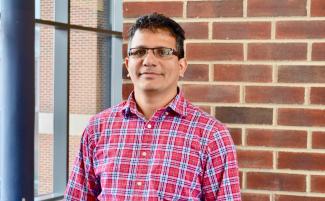Event
Organic Chemistry Seminar: Dr. Ramesh Giri
Postponed "Alkene Dicarbofunctionalization: Bond Formation at Classical and Non-classical Sites"

Postponed
Dr. Ramesh Giri
PSU
"Alkene Dicarbofunctionalization: Bond Formation at Classical and Non-classical Sites"
Alkenes serve as the most important feedstock for organic synthesis, having two vicinal sites for bond formation. Simultaneous construction of two carbon-carbon (C-C) bonds across these vicinal positions is a most powerful strategy, providing modular, convergent and expedient routes to generate complex products from simple starting materials. This process is highly significant from a synthetic perspective due to its ability to reduce a multistep process to a one-step endeavor. However, materializing such a process is fundamentally challenging due to the intrinsic natures of unactivated alkenes to undergo migratory insertion with slower kinetics than cross-coupling, and alkylmetal intermediates to undergo b-H elimination with faster kinetics than transmetalation/reductive elimination, both of which are detrimental to alkene difunctionalization.
In this talk, we introduce a novel concept of Synergistic Bimetallic Cationic Catalysis – a strategy that addresses both fundamental issues of slow kinetics of migratory insertion and fast kinetics of b-H elimination during alkene difunctionalization. We also introduce another conceptually novel idea – Metallacycle Contraction Process – a strategy that harnesses the potential of alkylmetal intermediates to undergo b-H elimination to difunctionalize unactivated alkenes at the non-classical 1,3-position rather than the classical 1,2-position that the alkenes occupy. In addition, we also present different catalytic conditions, which enable difunctionalization of vinyarenes and tethered alkenes, and offer short synthetic routes to access natural products and bioactive molecules. Mechanistic pathways pertaining to these new reactions devised based on radical probes, competition experiments and quantitative kinetic studies will also be discussed.
Research
Our research is focused in developing new sustainable organic transformations with transition metals and applying them to make feedstock chemicals, natural products, bioactive molecules and materials. Our work spans the areas of organic and organometallic chemistry, complex molecules synthesis, and polymer synthesis, PAH synthesis, nanographene synthesis. Our current research focuses are outlined below and we encourage you to check our publications for our detailed studies.
https://science.psu.edu/chem/people/rkg5374
HOST: MOLANDER
